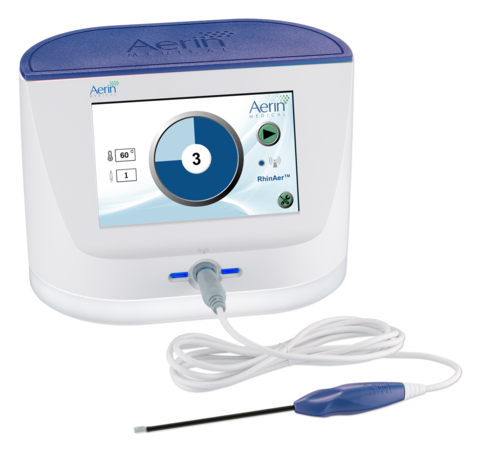SUNNYVALE, Calif.– Aerin Medical Inc., a company that provides Ear, Nose and Throat (ENT) physicians with non-invasive solutions to treat chronic nasal conditions, today announced the publication of positive 12-month results from RHINTRAC, a randomized, sham-controlled clinical trial, in the International Forum of Allergy & Rhinology (IFAR). These results for the trial’s active treatment arm showed that chronic rhinitis symptoms continued to improve through 12 months after treatment with RhinAer®. The findings build on a previous publication demonstrating treatment with RhinAer was safe and superior to a sham procedure control.1
ENTs use RhinAer, an innovative, temperature-controlled radiofrequency (RF) technology, to directly interrupt posterior nasal nerve (PNN) signals and to help reduce chronic rhinitis symptoms. Chronic rhinitis is a condition where symptoms such as nasal congestion and runny nose last more than four consecutive weeks. This condition can be challenging to treat and ENT physicians have historically had limited options for those who don’t respond to medical therapy.
“The RHINTRAC study provides one of the highest levels of clinical evidence to substantiate the safety, effectiveness and durability of RhinAer,” said Pablo Stolovitzky, M.D.; Adjunct Assistant Professor, Department of Otolaryngology, Emory University; CEO of ENT of Georgia North, Atlanta; and principal investigator of the RHINTRAC trial. “It’s impressive that the procedure in the treatment arm was not only well tolerated but patients had continued improvement in their chronic rhinitis symptoms, including cough and post-nasal drip, through 12 months.”
RHINTRAC, a multi-center, single-blind study, enrolled 117 patients seeking treatment for chronic rhinitis symptoms of at least six months duration. The patients were randomly assigned to active treatment with RhinAer or to a control arm where patients received a sham procedure that replicated the RhinAer treatment without delivering RF energy. At three months, trial arm assignments were revealed and qualified sham patients were given the option to cross over and undergo treatment with RhinAer. This publication reports 12-month follow-up results from 72 patients in the original active treatment arm, and 6-month follow-up results for the 25 crossover patients.
In the study, the percentage of patient responders in the active treatment arm continued to improve over the 12 months (67.5%, 75.0% and 80.6% at 3, 6, and 12 months, respectively). Responders are defined as patients with a ≥30% improvement in symptoms over baseline prior to procedure. Additional findings published in IFAR included:
- Magnitude of symptom reduction also improved through one year, as indicated by reflective total nasal symptom score (rTNSS) reduction of 43.3%, 53.0%, and 57.8% at 3, 6, and 12 months, respectively. This included statistically significant improvements in symptoms of rhinorrhea (i.e., runny nose), nasal congestion, nasal itching and sneezing, when compared to baseline. The rTNSS is a questionnaire evaluating the severity of the main symptoms of rhinitis.
- Patients had significant improvements in post-nasal drip and cough symptoms that were sustained through 12 months.
- Crossover patients experienced similar treatment response benefits compared to patients in the initial active treatment arm.
Treatment with RhinAer was well tolerated, with patients reporting low post-procedural pain scores, and no post-procedural headaches. No serious device or procedure-related adverse events have been reported in any treatment group to date.
“Publication of these data in such an esteemed journal truly underscores the validity of the trial and its outcomes, and the results are tracking well with our previously published multi-year data on the safety and efficacy of RhinAer,” said Scott Wolf, M.D., founder and chief medical officer of Aerin Medical. “We are grateful to our physician partners for their tireless efforts in building the clinical body of evidence for RhinAer — evidence that helps otolaryngologists make treatment decisions for their allergic and non-allergic chronic rhinitis patients.”


